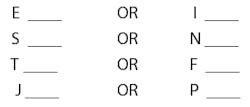Our personality type determines how we interact with our world, how we gather information, how we make decisions, and how we orient our lifestyles. It is who we are and dictates how we communicate with others.
by Stephanie Wall, RDH, MSDH, MEd
The American Heritage dictionary defines personality as "the quality or condition of being a person," "the totality of qualities and traits, as of character or behavior that are peculiar to a specific person," and "the pattern of collective character, behavioral, temperamental, emotional, and mental traits of a person." Our personality type determines how we interact with our world, how we gather information, how we make decisions, and how we orient our lifestyles. It is who we are and dictates how we communicate with others.
My first experience with personality typing was as a dental hygiene student. During our first week of school, an instructor gave us a questionnaire to complete that, she said, would indicate what our personality type was. I had never heard of such a thing and was quite curious as to what it would reveal. The result of mine was that I was an ESFJ, which stood for Extroverted — Sensor — Feeler — Judger, whatever that meant. The instructor further explained what each of the preferences were and that combined they were a four letter type. I must say, it was interesting to view myself while keeping these certain traits in mind. I found that knowing what type I was not only helped me understand myself better, but helped me understand my classmates as well. We kidded each other about what "type" we were but eventually used the information to better communicate. Crazy as it sounds, having this kind of information really does work. Today, I am still an ESFJ and still interested in the types of others.
The History of Personality Typing
In looking briefly at the history of personality typing, we can go back to the time of Carl Jung, a Swiss physician who in the 1920s published Psychological Types based on his research (flashback to Psych 101). His writings inspired Isabel Myers, a layperson interested in the personality differences she had observed while "people watching." She shared her interests with her mother, Kathryn Briggs, and together they devised a personality questionnaire. They based the concept of their questionnaire on the 16 types Jung originally identified in his writings. This 93-item, forced-answer questionnaire, known as the Myers Briggs Type Indicator (MBTI), has been used repeatedly in research, and by the 1990s, had been completed by nearly one million people per year.
A more commonly used questionnaire, the Keirsey Temperament Sorter (KTS II), was developed by Dr. David Keirsey, a clinical psychologist, based loosely on the questions of the original MBTI. The main difference is that his 70-item, forced-answer questionnaire specifically addresses people preferences and temperaments in their interactions with the world and immediate environment. These preferences are as follows, with their commonly used identifiers in parentheses:
(E) Extroversion vs. Introversion (I)
(S) Sensing vs. Intuition (N)
(T) Thinking vs. Feeling (F)
(J) Judging vs. Perceiving (P)
These preferences are commonly paired; i.e., E with I, S with N, etc., and represent opposing types. Each of the four pairs is combined into a four-letter "type" based on the questionnaire responses given. The 16 variants are as follows:
As stated previously, the letters stand for how people gain energy (Extroversion or Introversion), how they gather or become aware of information (Sensing or Intuition), how they decide or come to a conclusion about that information (Thinking or Feeling), and how they deal with the world around them (Judging or Perceiving).
- If you prefer Extroversion, you focus on the outside world to get energy through interacting with people and/or doing things.
- If you prefer Introversion, you focus on the inner world and get energy through reflecting on information, ideas, and/or concepts.
- If you prefer Sensing, you notice and trust facts, details, and present realities.
- If you prefer Intuition, you attend to and trust interrelationships, theories, and future possibilities.
- If you prefer Thinking, you make decisions using logical, objective analysis.
- If you prefer Feeling, you make decisions to create harmony by applying person-centered values.
- If you prefer Judging, you tend to be organized and orderly and to make decisions quickly.
- If you prefer Perceiving, you tend to be flexible and adaptable and to keep your options open as long as possible.
In reading through these descriptions, it is important to remember that these are simply preferences and that each of us has a bit of each preference in our personality. By "typing" ourselves, it simply helps us understand where we stand in the big picture of things and in how others function around us. Through this understanding, we can better communicate and learn to embrace the differences each of us possesses.
Now, take a look at the following and see if you can find where your best fit is. You might surprise yourself!
An Extrovert (E) ...
- Tends to talk first, think later (does "open mouth, insert foot" ring a bell?)
- Knows many people and considers them "close friends" (in fact, everyone is a friend)
- Doesn"t mind distractions (probably hopes for them, actually)
- Is easily approachable by others (and takes over the conversation immediately)
- Finds phone calls a welcome interruption (any opportunity to talk is a welcome one)
- Prefers generating ideas with a group (because too much time spent "reflecting" is exhausting)
- Finds listening more difficult than talking (as he/she gets so bored if not the center of attention)
- Looks with the mouth instead of the eyes (and has to verbalize everything!)
An Introvert (I) ...
- Rehearses things before saying a word (and prefers that others would take a hint)
- Enjoys his/her "quiet time" (extroverts could learn a thing or two)
- Is perceived as a "great listener" (but feels taken advantage of)
- Has been called "shy" (and again, extroverts could take a hint)
- Likes to share with one other person or a few "select" people (and is picky about who those people are)
- Wishes he/she could be more forthcoming with ideas (so that "certain individuals" don"t blurt them out before him/her)
- Likes to share thoughts and feelings (without interruptions, thank you very much)
- Believes that "talk is cheap" (have you ever heard of "reinventing the wheel"?)
A Sensor (S) ...
- Prefers specific answers to specific questions (and hates it when someone states time as "around four-ish" instead of exactly "four")
- Likes to be "in the moment" (you know, like, "stop and smell the roses")
- Finds most satisfying jobs that result in something "tangible" (not like those who have their "head in the clouds")
- "If it ain"t broke, don"t fix it" is his/her motto (some things just can"t be improved upon)
- Wants clear instructions from the outset (none of the "we"ll discuss details later")
- Uses words literally (and can be very gullible)
- Views the trees instead of the forest (seeing the "big picture" is so not his/her thing)
- Says "seeing is believing" (show me the proof)
An Intuitor (N) ...
- Thinks of several things at once (i.e., the absentminded professor)
- Finds the future and its possibilities intriguing (so much to do, so little time)
- Believes that "boring details" is redundant (Get it? Boring? Details? Yada, yada, yada)
- Believes time is relevant (according to his/her clock, anyway)
- Likes to figure out how things work just because he/she can (even if it means breaking something)
- Doesn't accept things at face value (what is that anyway?)
- Gives general answers to questions (and doesn't understand it when people can't follow his/her directions)
- Loves to spend money, not manage it (that's so not fun)
A Thinker (T) ...
- Is able to stay cool, calm, and collected in times of disarray (chill, already)
- Enjoys proving a point for clarity sake (and argues both sides if necessary)
- Is more firm-minded than gentle-hearted (tells it like it is)
- Prides him/herself on his/her objectivity (someone has to be)
- Doesn"t mind making difficult decisions (why is this so hard for everyone else?)
- Believes firmly in what is logical and scientific (UFOs? Please …)
- Remembers numbers and figures to faces and names (and is so much fun at parties)
A Feeler (F) ...
- Believes a good decision is one that considers other"s feelings (oh, where"s my hankie?)
- Will bend over backward to meet the needs of others (even at the expense of him/herself)
- Puts him/herself in other people"s shoes (which is not always an easy task)
- Enjoys providing needed services to people (and always has a helping hand)
- Prefers harmony over clarity (let"s just all get along)
- Wonders why "No one cares about what I want" (but would never dream of saying it out loud)
- Feels that "love" cannot be defined (and how dare anyone try!)
A Judger (J) ...
- Is always waiting for others (and tapping his/her foot in impatience while doing so)
- Has a place for everything and everything in its place (and don"t anyone dare move a thing)
- Believes if everyone would only do his/her part, the world would be a better place (and also believes "world peace" is possible)
- Has a schedule and likes to follow it (and doesn"t like any "surprises" added to it)
- Doesn"t like surprises (see above)
- Needs to have order (and harmony, and happiness, and neatness, etc.)
- Keeps lists and uses them (and adds items just so he/she can cross them off)
A Perceiver (P) ...
- Is easily distracted ("A focused mind ...")
- Loves to explore the unknown (sci-fi and all that)
- Doesn"t plan but waits to see what happens (does spontaneity ring a bell?)
- Depends on last-minute spurts of energy to meet deadlines (and drives everyone else nuts because of it)
- Believes neatness doesn"t count (who says "it"s next to godliness? Or is that "cleanliness …"?)
- Changes the subject in conversations (and confuses everyone in the process)
- Makes things less definitive from time to time (in fact, most of the time)
- Turns work into play (and believes we should all let the child out more often)
How does your personality fit in?
Now, after reading these entertaining personality traits, select the following that you believe represent you best.
And determine your personality type: ––––––––––––––––
Of course to truly get a handle on what your type is, you will need to complete the Keirsey questionnaire, the KTS II. There are a couple of Web sites you can check out that allow you to complete the questionnaire for free. You can also see your four-letter type for free; however, if you want a full report, there is an additional fee. If you"re really curious, the extra fee is worth it. The two Web sites are http://www.keirsey.com and http://www.personalityzone.com.
In the second part of this article, I will explain how Keirsey further defines the types — Guardian, Idealist, Artisan, and Rational — so that you can get even a better idea of where you fit in the big picture of personality. Until then, go online, complete the questionnaire, and have fun. You might even try to get family, friends, and colleagues to join in and see what type they are!
About the Author
Stephanie Wall, RDH, MSDH, MEd, has been in dental hygiene for 21 years as a clinician and educator. Her company, Dentally Speaking, offers services in personality assessment, identifying learning styles, behavior modification in patient education, and emotional intelligence. She is currently certified to administer the Keirsey Temperament Sorter™ (KTSII) and Integrated Performance Management™ (IPM) assessments. She is available for speaking engagements, workshops, seminars, and private practice consulting. You may contact her at [email protected], by visiting www.dentallyspeaking.com, or by phone at (952) 818-5057.
Resources
- http://www.16types.com
- http://www.16types.com
- http://www.bartleby.com
- http://www.capt.org
- http://www.keirsey.com
- http://personalityzone.com
- http://similarminds.com/jung
- Jung C. Psychological types. Princeton University Press, 1971.
- Keirsey D. Please understand me II: temperament, character, intelligence. Prometheus Nemesis Book Co., 1998.
- Kroeger O, Thuesen J. Type talk: the 16 personality types that determine how we live, love, and work. Dell Publishing, 1988.
- Montgomery S. People patterns: a modern guide to the four temperaments. Archer Publications, 2002.
- Myers IB, Myers P. Gifts differing: understanding personality type. Davies-Black Publishing, 1980.
- Myers IB, McCaulley MH, Quenk NL, Hammer AL. MBTI manual (a guide to the development and use of the Myers Briggs type indicator). Consulting Psychologists Press, 3rd Ed., 1998.









